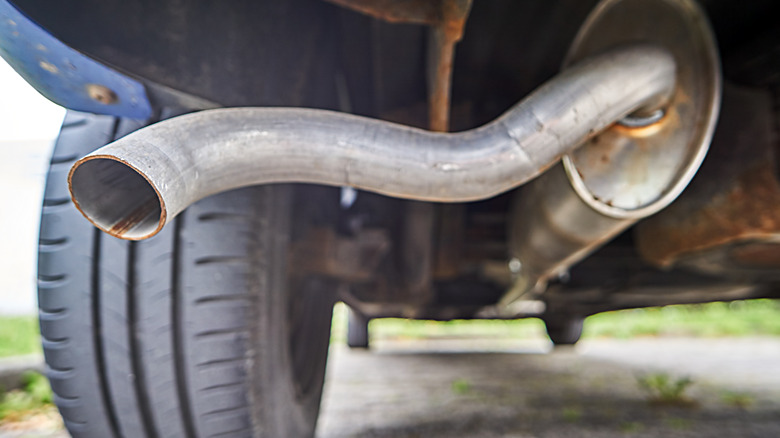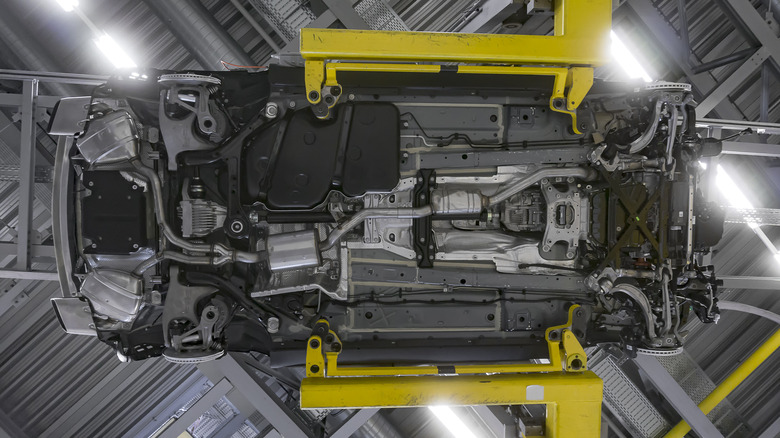How To Check Your Vehicle For Exhaust Leaks (And What To Do If You Find One)
There's a lot going on inside your vehicle at any given time, whether you're idling at a red light or driving at freeway speeds. Much of this activity involves chemical reactions that — while essential to your ride's operation — could be harmful to the human body. That's where the exhaust system comes in, cycling the byproducts of combustion safely away from your vehicle to keep you safe and healthy. Unfortunately, like any system that carries fluids or gases, the exhaust system can develop leaks. Leaks in your car's exhaust system can affect performance, fuel economy, and emissions, not to mention make your car obnoxiously loud.
There are a few big exhaust problems to look out for. For instance, different colors of exhaust smoke mean different things for your car, and problems can sprout up anywhere from the cylinder heads to the tailpipe. To spot leaks, there are a few different approaches to take. If you don't immediately see cracks or gaps, smell anything unusual or unpleasant, or notice your exhaust has gotten louder, you can look for concentrations of soot along your exhaust pipes, as this buildup is indicative of a leak. Exhaust leaks will sometimes also cause your check engine light to come on. Alternatively, with the vehicle running, you can cover the tailpipe with a rag or thick sponge, which forces air out through the leak further up. It's sometimes helpful to have a friend block the tailpipe while you listen or vice versa, and revving the engine can make the noise easier to pinpoint. Once you have a rough idea of where the leak might be, you can spray soapy water around the exhaust system components. If bubbles appear in a particular spot, there's your leak. Of course, identification is only half the battle. Once the problem area has been spotted, what should you do next?
You might be able to patch a small exhaust leak
There are a few ways an exhaust leak repair job can go. If it's at a point where two components come together — like flanges, where the manifold meets the heads, or at catalytic converter or muffler connections — just tightening some bolts might do the trick. If there's a small crack in one of the pipes but you don't want to replace it immediately, there are quick DIY remedies to consider. Cleaning and sanding the area, applying an epoxy bond, and putting exhaust tape over it is a fine temporary solution. However, this is a temporary solution and you should replace the cracked pipe as soon as possible. You'll also have to go to do this immediately if the leaks are too large or too numerous to simply patch up.
If your leak is along a joint or at the manifold, you want to remove the bolts, thoroughly clean the impacted area with a wire brush or similar abrasive tool, and install a new gasket. The leak or leaks could also be on the catalytic converter, exhaust pipe, or muffler, requiring complete replacement of these parts. If you're comfortable handling such replacements, they are usually simple bolt-and-clamp swaps that can be done with a set of basic garage tools. Exhaust leaks may seem like little more than a nuisance, but there's more to the story than loud noises and strange smells. Leaving them untreated can have major, costly consequences.
Exhaust leaks can damage your body and your car
Whether you have a small or significant exhaust leak, you don't want to ignore it for long. In fact, exhaust leaks can have serious heath consequences for you or anyone who rides in your car. Leaks can allow dangerous gases like carbon monoxide to escape the vehicle unsafely, potentially into the cabin. Carbon monoxide poisoning can lead to anything from dizziness and nausea to a loss of consciousness, and can even kill you. Improperly filtered exhaust gases can also cause breathing problems, heart attacks, high blood pressure, and strokes.
Exhaust leaks can also do serious damage to your vehicle. Depending on the location of the leak, your catalytic converter can become less efficient or fail entirely. This means more pollutants in the air and a chance your car will fail emissions testing. Your oxygen sensors can give false readings and eventually fail, leading to worse gas mileage and a rough idle among other issues. If the leak is near the exhaust manifold, your engine may overheat and suffer extensive internal damage over time. As innocuous as some exhaust leaks can seem, the fact is they shouldn't be ignored. While it's unfortunately true that the cost of repairing modern vehicles has gone up in recent years, getting on top of exhaust leaks means saving money, your health, and possibly your life.


